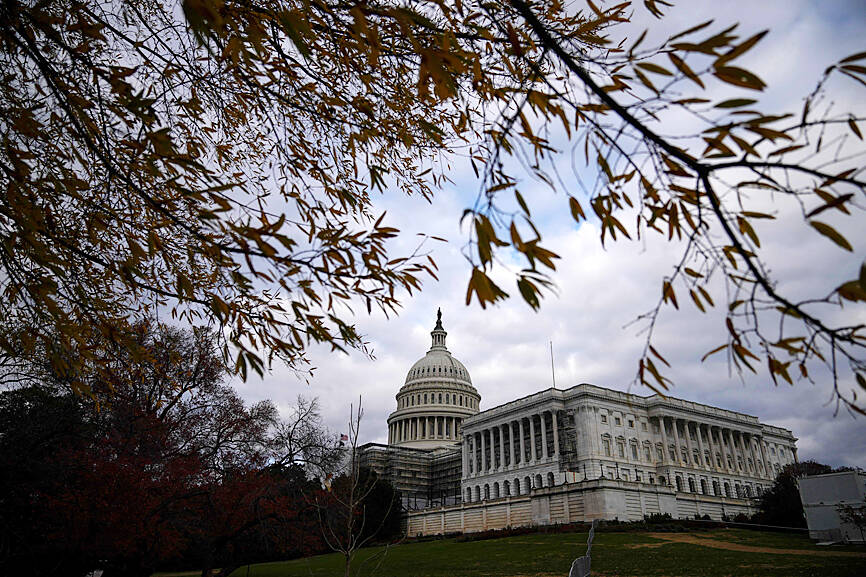The US Senate Armed Services Committee on Tuesday filed its draft of an annual defense policy bill containing provisions to bolster defense and cybersecurity cooperation with Taiwan.
The draft, the National Defense Authorization Act (NDAA), which the committee approved in a bipartisan 24-1 vote on June 23, would authorize US$876.8 billion for military and national defense programs at the US departments of defense and energy.
It is to be debated in the Senate.

Photo: AFP
The bill directs the US secretary of defense to work with their counterpart in Taiwan to establish a “comprehensive training, advising and institutional capacity-building program” for Taiwan’s military forces.
The program would be aimed at enabling a “layered defense” of Taiwan by Taiwanese forces, including through the use of an asymmetric defense strategy, and would also boost interoperability between Taiwan and US forces and encourage information sharing, the bill says.
The legislation would also require US officials, including the secretary of defense and the heads of the US Cyber Command and the US Indo-Pacific Command, to engage with Taiwan on expanding military cybersecurity cooperation.
Aside from these initiatives, the draft NDAA would instruct the US Department of Defense to provide an assessment to the US Congress on how Taiwan has integrated the military capabilities it has received from the US over the previous 10 years.
It would also mandate the completion of a “comprehensive analysis of the risks and implications of a sustained military blockade of Taiwan” by China, a report that would be carried out by the secretary of defense and the chairman of the US Joint Chiefs of Staff in coordination with the US director of national intelligence.
The analysis would include an assessment of how China might execute a blockade, its possible precursors or warning signs, its potential effects on Taiwan and the US, and military and nonmilitary options for countering a blockade, the bill says.
In addition to the draft NDAA in the Senate, the US House of Representatives Armed Services Committee passed a separate version of the legislation late last month.
Typically, after the House and Senate have passed their own versions of the NDAA, they negotiate a reconciliation of the bill to send to the president to sign into law before the end of the year.

Japanese footwear brand Onitsuka Tiger today issued a public apology and said it has suspended an employee amid allegations that the staff member discriminated against a Vietnamese customer at its Taipei 101 store. Posting on the social media platform Threads yesterday, a user said that an employee at the store said that “those shoes are very expensive” when her friend, who is a migrant worker from Vietnam, asked for assistance. The employee then ignored her until she asked again, to which she replied: "We don't have a size 37." The post had amassed nearly 26,000 likes and 916 comments as of this

US President Donald Trump said "it’s up to" Chinese President Xi Jinping (習近平) what China does on Taiwan, but that he would be "very unhappy" with a change in the "status quo," the New York Times said in an interview published yesterday. Xi "considers it to be a part of China, and that’s up to him what he’s going to be doing," Trump told the newspaper on Wednesday. "But I’ve expressed to him that I would be very unhappy if he did that, and I don’t think he’ll do that," he added. "I hope he doesn’t do that." Trump made the comments in

Tourism in Kenting fell to a historic low for the second consecutive year last year, impacting hotels and other local businesses that rely on a steady stream of domestic tourists, the latest data showed. A total of 2.139 million tourists visited Kenting last year, down slightly from 2.14 million in 2024, the data showed. The number of tourists who visited the national park on the Hengchun Peninsula peaked in 2015 at 8.37 million people. That number has been below 2.2 million for two years, although there was a spike in October last year due to multiple long weekends. The occupancy rate for hotels

A cold surge advisory was today issued for 18 cities and counties across Taiwan, with temperatures of below 10°C forecast during the day and into tonight, the Central Weather Administration (CWA) said. New Taipei City, Taipei, Taoyuan and Hsinchu, Miaoli and Yilan counties are expected to experience sustained temperatures of 10°C or lower, the CWA said. Temperatures are likely to temporarily drop below 10°C in most other areas, except Taitung, Pingtung, Penghu and Lienchiang (Matsu) counties, CWA data showed. The cold weather is being caused by a strong continental cold air mass, combined with radiative cooling, a process in which heat escapes from